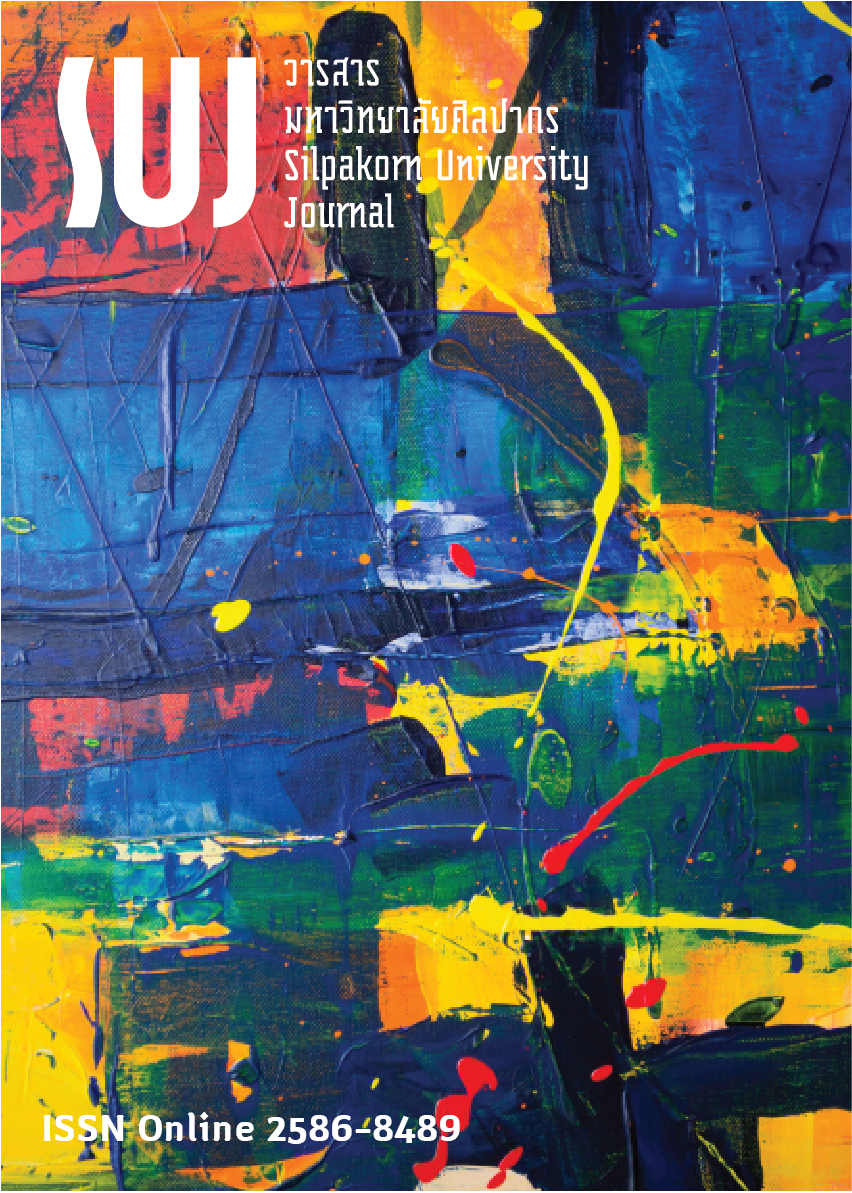การท่องเที่ยวเชิงกิจกรรม : ทางเลือกใหม่ของการท่องเที่ยวอย่างยั่งยืน (Event tourism: a new alternative for sustainable tourism)
Main Article Content
Abstract
บทความนี้นำเสนอแนวทางการบริหารจัดการการท่องเที่ยวเชิงกิจกรรม เพื่อเป็นทางเลือกหนึ่งของการท่องเที่ยวอย่างยั่งยืน ประกอบด้วย 5 หัวข้อหลัก ได้แก่ (1) บทนำ ว่าด้วยแนวคิดในภาพรวมเกี่ยวกับการท่องเที่ยวเชิงกิจกรรมอย่างยั่งยืน (2) การท่องเที่ยวเชิงกิจกรรมขนาดเล็ก รูปแบบหนึ่งของการท่องเที่ยวเชิงกิจกรรมอย่างยั่งยืน อันแสดงให้เห็นถึงความเหมาะสมและแนวทางการใช้การท่องเที่ยวเชิงกิจกรรมขนาดเล็กเพื่อส่งเสริมการท่องเที่ยวภายใต้แนวคิดการท่องเที่ยวอย่างยั่งยืน โดยบรรลุทั้งวัตถุประสงค์ด้านการท่องเที่ยวและวัตถุประสงค์เดิมของการจัดกิจกรรม (3) การท่องเที่ยวเชิงกิจกรรม ทางออกหนึ่งของการแก้ปัญหาธุรกิจการท่องเที่ยวในช่วงนอกฤดูกาลท่องเที่ยวเพื่อความยั่งยืนทางเศรษฐกิจ โดยได้นำเสนอแนวทางอย่างเป็นรูปธรรมในการใช้การท่องเที่ยวเชิงกิจกรรมเพื่อแก้ปัญหาการลดลงของจำนวนนักท่องเที่ยวและรายได้จากการท่องเที่ยวในช่วงนอกฤดูกาลท่องเที่ยว (4) การคมนาคมอย่างยั่งยืนเพื่อการท่องเที่ยวเชิงกิจกรรม ซึ่งเป็นตัวชี้วัดด้านความยั่งยืนประการหนึ่งของการท่องเที่ยวเชิงกิจกรรม โดยได้นำเสนอแนวทางการวางแผนและการบริหารจัดการการคมนาคมของนักท่องเที่ยวผู้เข้าร่วมการท่องเที่ยวเชิงกิจกรรม และ (5) กรอบแนวคิดและแนวทางการจัดการการมีส่วนร่วมของผู้มีส่วนได้ส่วนเสียหลากหลายกลุ่มต่อการดำเนินงานการท่องเที่ยวเชิงกิจกรรมอย่างยั่งยืน ซึ่งประกอบด้วยกลยุทธ์สามระดับและหกขั้นตอนการดำเนินงาน ทั้งนี้ ผู้บริหารแหล่งท่องเที่ยวหรือผู้มีส่วนเกี่ยวข้องกับการจัดการท่องเที่ยวเชิงกิจกรรม สามารถใช้ประโยชน์จากเนื้อหาของบทความนี้เป็นแนวทางในการบริหารจัดการการท่องเที่ยวเชิงกิจกรรมอย่างยั่งยืน เพื่อให้ได้รับผลลัพธ์ในด้านบวกมากที่สุดและเกิดผลกระทบในด้านลบน้อยที่สุดในระยาวทั้งในด้านเศรษฐกิจ สังคม และสิ่งแวดล้อม
This article consists of five main topics: (1)an introduction that provides an overview of sustainable event tourism, (2) a discussion of small event tourism that explains how small events can be appropriately adapted for sustainable event tourism and how to use small event tourism to promote sustainable tourism in order to achieve the goals of both the tourism business and the event itself, (3) a discussion of event tourism as an alternative solution for economic sustainability during the low tourist season.Practical guidelines are presented in order to solve economic problems as a result of a decline in the number of tourists and the amount of tourism revenue during the low tourism season. (4) A discussion of sustainable transportation as one of indexes to measure the sustainable aspect of event tourism. Specifically, there is an emphasis on the means to plan and manage the transportation or mobility of tourists who participate in event tourism. Finally, (5) a discussion of how to implement a multi-stakeholder’s involvement in the management framework for sustainable event tourism. This framework consists of three strategic levels and six stages which are embedded within these three levels. Additionally, this article reveals guidelines for sustainable event tourism management with the aim of maximizing positive benefits while minimizing negative impacts in the long term. These guidelines cover three significant dimensions, namely, economic, social, and environmental. This information can benefit management as well as all other stakeholders involved in event tourism.
Downloads
Article Details
References
Chirieleison, C. & Scrucca, L. (2017). Event sustainability and transportation policy: A model-based cluster analysis for a cross-comparison of hallmark events. Tourism Management Perspectives, 24: 72-85.
Choi, H. C. & Sirakaya, E. (2006). Sustainability indicators for managing community tourism. Tourism Management, 27(6): 1274-1289.
Connell, J., Page, S. & Meyer, D. (2015). Visitor attractions and events: Responding to seasonality. Tourism Management, 46: 283-298.
Gibson, J. H., Kaplanidou, K. & Kang, J. S. (2012). Small-scale event sport tourism: A case study in sustainable tourism. Sport Management Review, 15(2): 160-170.
Goeldner, C. R. & Ritchie, J. R. B. (2009). Tourism: Principles, practices, philosophies (11th ed.). Hoboken, NJ: John Wiley.
Horng, J. & Hu, M. M. (2014). How the introduction of concepts of energy saving and carbon reduction (ESCR) can affect festival visitors’ behavioural intentions: An investigation using a structural model. Journal of Sustainable Tourism, 22(8): 1216-1235.
Kaewthep, Karnjana. (2014). Communication-Tourism (เรื่องสื่อสาร-การท่องเที่ยว). Bangkok: Parbpim.
Kay Xin, T., Chan, J. K. L., Vogt, C. A. & Mohamed, B. (2016). Comprehending the responsible tourism practices through principles of sustainability: A case of Kinabalu Park. Tourism Management Perspectives, 18: 34-41.
Kelly, M. D. & Fairley, S. (2018). What about the event? How do tourism leveraging strategies affect small-scale events?. Tourism Management, 64: 335-345.
Lim, W. M. (2016). Creativity and sustainability in hospitality and tourism. Tourism Management Perspectives, 18: 161-167.
Liu, Z. (2003). Sustainable tourism development: A critique. Journal of Sustainable Tourism, 11(6): 459-475.
Menezes, T. R. d. & Souza, J. F. d. (2014). Transportation and urban mobility in mega-events: The case of Recife. Procedia - Social and Behavioral Sciences, 162: 218-227.
Misener, L. (2015). Leveraging parasport events for community participation: Development of a theoretical framework. European Sport Management Quarterly, 15(1): 1-22.
Müller, M. (2015). The mega-event syndrome: Why so much goes wrong in mega-event planning and what to do about it. Journal of the American Planning Association, 8(1): 6-17.
National News Bureau of Thailand. (2018). May 19 - 27, 2018 Please be welcome to Chantaburi food festival (19 - 27 พฤษภาคม 2561 เชิญเที่ยวงาน วิถีจันท์ วิถีไทย ของดีเมืองจันท์วันผลไม้ 2561). [Online]. Retrieved September, 28 from http://thainews.prd.go.th
O’Brien, D. & Chalip, L. (2007). Executive training exercise in sport event leverage. International Journal of Culture, Tourism and Hospitality Research, 1(4): 296-304.
Painaidii. (2014). Ping River Love Festival@Tak Province, Thailand (งานวัฒนธรรมแห่งความรักเหนือลุ่มแม่น้ำปิง@จังหวัดตาก). [Online]. Retrieved September 25, 2018 from http://www.painaidii.com/event/event-detail/00003767/lang/e/
Panyik, E., Costa, C. & Ratz, T. (2011). Implementing integrated rural tourism: An event-based approach. Tourism Management, 32(6): 1352-1363.
Prachachartonline. (2018). Andaman Hotelier and Tourism Fair 2018 in Phuket (ภูเก็ตจัดงาน Andaman Hotelier and Tourism Fair 2018). [Online]. Retrieved September 26, 2018 from https://www.prachachat.net/local-economy/news-164360
Pratiwi, A., Zhao, S. & Mi, X. (2015). Quantifying the relationship between visitor satisfaction and perceived accessibility to pedestrian spaces on festival days. Frontiers of Architectural Research, 4(4): 285-295.
Prayag, G., Hosany, S., Nunkoo, R. & Alders, T. (2013). London residents’ support for the 2012 Olympic games: The mediating effect of overall attitude. Tourism Management, 36(June): 629-640.
Prideaux, B. (2008). The role of visitor attractions in peripheral areas. In Managing visitor attractions: New directions, edited by Alan Fyall, Brian Garrod & Anna Leask, pp. 80-94. Oxford: Butterworth-Heinemann.
United Nations World Tourism Organization. (2004). Concepts & definitions: Sustainable development of tourism conceptual definition. [Online]. Retrieved August 30, 2018 from www.unwto.org/frameset/frame_sustainable.html.
Veltri, F. R., Miller, J. & Harris, A. (2009). Club sport national tournament: Economic impact of a small event on a mid-size community. Recreational Sport Journal, 33(2): 119-128.
Waligo, V. M., Clarke, J. & Hawkins, R. (2013). Implementing sustainable tourism: A multi-stakeholder Involvement management framework. Tourism Management, 36: 342-353.
World Tourism Organization. (2019). Definition of sustainable tourism. [Online]. Retrieved May 12, 2019 from https://sdt.unwto.org/content/about-us-5
Zarei, A. & Yusof, A. B. (2014). Informational sources of sport tourists attending ISTAF super series. Journal of Physical Education and Sport, 14(4): 554-561.
Zheng, J., Garrick, N. W., Atkinson-Palombo, C., McCahill, C. & Marshall, W. (2013). Guidelines on developing performance metrics for evaluating transportation sustainability. Research in Transportation Business & Management, 7: 4-13.
Ziakas, V. (2010). Understanding an event portfolio: The uncovering of interrelationships, synergies, and leveraging opportunities. Journal of Policy Research in Tourism, Leisure and Events, 2(2): 144-164.


